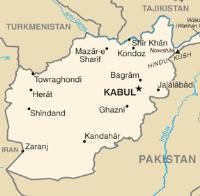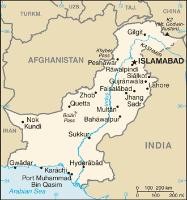With the security situation in Iraq improved to the point where Secretary of Defense Robert Gates referred to entering the “endgame” in Congressional testimony yesterday, the question of what to do in Afghanistan is getting more and more attention every day. In the same testimony Gates, when pressed, conceded the possibility of adding three more brigades to our troop presence there next spring. That’s in addition to the additional brigade announced by President Bush for February, and would roughly meet the repeated requests of theater commanders. Meanwhile, the White House has announced an interdepartemental strategic review of Afghanistan policy to […]
Afghanistan Archive
Free Newsletter
When Pakistan’s new president, Asif Ali Zardari, met privately with U.S. President George W. Bush on the sidelines of the U.N. General Assembly in New York Tuesday, the deteriorating security situation along the Afghan-Pakistani border was certainly a central topic of discussion. But while cross-border attacks from both sides of the frontier are seriously exacerbating relations between Afghanistan, Pakistan, and the United States, they might also paradoxically be driving the three countries to consider ever-deeper levels of cooperation. Afghan officials, and their American and NATO allies, have long criticized their Pakistani counterparts for failing to suppress the numerous Islamist militants […]
Janine Davidson at Intel Dump cites a Tom Johnson and M. Chris Mason piece in the Atlantic, All Counterinsurgency is Local, before discussing the tension between the tactics of counterinsurgency, which emphasize engaging with governance and authority at the most immediate (ie. local) level, and the strategy of counterinsurgency, which emphasizes shoring up governance and authority at the national level: [T]he question we need to examine is about tradeoffs. What are we sacrificing from a national or international security perspective when we focus on human security at the local level, as Johnson and Mason suggest? What might an international system […]
A quick word on today’s vote by the French Parliament to extend the mission in Afghanistan, which for political reasons was never in doubt. The vote comes in the aftermath of the Taliban ambush last month that left ten French soldiers dead, an ambush that has had a very long media trail here in France. Immediately after the shocking news, gruesome rumors circulated about the circumstances surrounding the soldiers’ deaths, rumors that the authorities were very slow to respond to. Soon thereafter, Paris Match published photos of the Taliban who had been involved in the ambush, provoking a storm of […]
The widening of the Afghanistan War into Pakistan takes on added significance in light of two news items today. The first is a report that Pakistani forces on the Afghan frontier once again opened fire on American helicopters that “strayed” across the border. The second, more damning, is a report via Army Times that Pakistani helicopters repeatedly “strayed” across the frontier last June in order to resupply Taliban forces engaged in a “significant fight” with Afghan Border Police. The report is based on the account of an American officer embedded on a training mission with the Afghan troops, and is […]
Pakistan officials say U.S. cross-border strikes are counterproductive. Defense Secretary Gates is coy about whether the Pakistani government authorized the strikes, and says the U.S. will “take whatever action is necessary to protect our troops.” From a counterinsurgency perspective, are such strikes the best way to protect our troops? Retired Lt. Col. John Nagl doesn’t appear to think so. Here’s what he said in an interview we published today: It is impossible to kill or capture your way out of an insurgency. Although cross-border raids can be tactically effective, they come with significant political costs that must be weighed carefully. […]
John A. Nagl, 42, is a senior fellow at the Center for a New American Security. He is a retired Army lieutenant colonel, a veteran of both Operation Desert Storm and the current conflict in Iraq, and was one of the writers of the Army/Marine Corps Counterinsurgency Field Manual. He is also the author of “Learning to Eat Soup with a Knife,” published in 2005. In that book he uses archival sources and interviews to compare the development of counterinsurgency doctrine and practice in the 1948-1960 Malayan Emergency with the strategy used in the Vietnam War. Urs Gehriger of the […]
Yesterday, I linked with arithmetic snark but without comment to TX Hammes’ Small Wars Journal post on the broadening of the Afghanistan War into Pakistan. It’s a very important piece, because it points out the danger of seeing Pakistan exclusively through the lens of our own tactical needs in Afghanistan, while ignoring the fact that for Pakistan, managing the Taliban (whether in Afghanistan or its own tribal areas) is part of the broader strategic calculus of its rivalry with India. Hammes argues that until we develop a strategy for handling this broader regional architecture, our efforts in Afghanistan (which he […]
It seems like Afghanistan specialist Kip is the latest anonymous, third-person analyst to sign off over at Abu Muqawama. But before leaving he dropped two posts, one questioning the actual numbers behind the recent announcement of troop increases there, and another supporting the widening of operations to the Pakistani side of the frontier: Kip thinks the apparent decision to overtly undertake commando operations in Pakistan is a positive step. There is simply no way to win in Afghanistan without going after sanctuaries in Pakistan. I agree with the second sentence, if not with the first, even if Kip goes on […]
Nikolas Gvosdev makes a good point. Dealing with Pakistan’s military hasn’t necessarily been straightforward these past seven years. They’ve got their own agenda, and haven’t been afraid to pursue policies — both overt (ie. negotiated peace deals with Pakistani-based Taliban) and covert (ie. support for Afghan-based Taliban) — that are at odds with American interests. But at least they couldn’t use claims of democratic legitimacy as cover. Now with the return of civilian rule in Islamabad, we’ve got to consider the possibility that not only are we not going to get what we want from the Pakistanis, but that they […]
The question of what to do in Afghanistan (and alongside it, Pakistan), is beginning to get the attention it deserves. So far, the default answer is converging on sending more troops, with little real thought as to where they’ll come from and the resulting problems that will cause. Some will apparently be cycled in from a drawdown in Iraq. But the Iraq drawdown, as formulated so far, is going to come at a snail’s pace, with the possibility of it being halted or reversed as conditions on the ground dictate. Barack Obama fleetingly addressed the issue in his Berlin speech […]
It’s admittedly been a while since I wrote about Iraq, which is a testament to the ways in which that conflict has become a mature stabilization operation. Twenty-three U.S. soldiers dead in August is twenty-three too many. But the security gains since January 2007 are enormous and game-changing. I was opposed to the Surge when President Bush announced it, I’ve been skeptical of the weight it’s been given as a causal factor of the decline in violence, and I remain unconvinced that it has accomplished its ultimate strategic goal of ensuring that Iraq’s ethnic, sectarian and factional conflicts are resolved […]

MAZAR-I-SHARIF, Afghanistan — The kinds of tourists you meet in Afghanistan are not quite the same as those you’d be likely to meet on the Costa del Sol. First of all, there are fewer of them, far fewer — perhaps only a few hundred a year. But if it can be said that Costa del Sol tourists share at least one trait in common (a love of the sun), today’s visitors to Afghanistan share something else: curiosity, perhaps with a dash of recklessness. While post-invasion Afghanistan has never descended into the kinds of violence and anarchy seen in Iraq, it […]
If you haven’t already read Dexter Filkins’ NYT feature on the Pakistani tribal areas (via Small Wars Journal), do so now, before the “Invade Pakistan” chorus swells. As Filkins’ reporting makes clear, there are multiple layers to the power struggle going on there, and the complexities of the competing rivalries make the debate Stateside seem simplistic at best. Within the Pakistani leadership there’s a civilian-military split, and within the military there’s an ISI/fundamentalist faction that’s not necessarily integrated into the chain of command. Within the tribal areas, there’s a Taliban-traditionalist split that includes both homegrown rivalries as well as foreign […]

Following years of promising gains since 2001, Afghanistan is in a tailspin. Not long ago, a sophisticated Taliban assault on a Kandahar prison freed 1,200 inmates, including 350 Taliban members. The attack came only weeks after Afghan President Hamid Karzai survived a fourth assassination attempt. The main forces behind the country’s downward spiral are al-Qaida and the Taliban, which have found sanctuary in the vast unpoliced region of western Pakistan known as the Federally Administered Tribal Areas (FATA). Stabilizing the Afghan-Pakistani front of the war on terrorism will require U.S. policymakers to re-examine the fatal misconception that they face only […]
